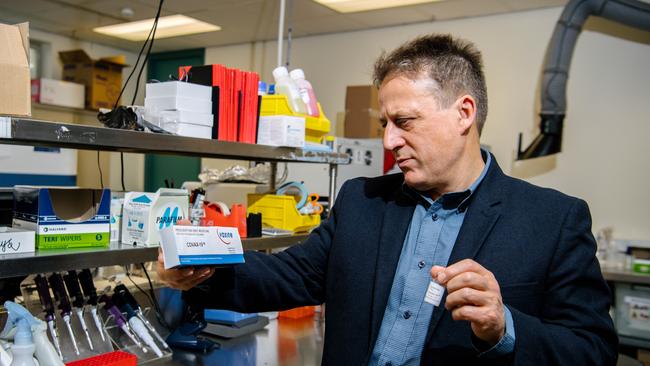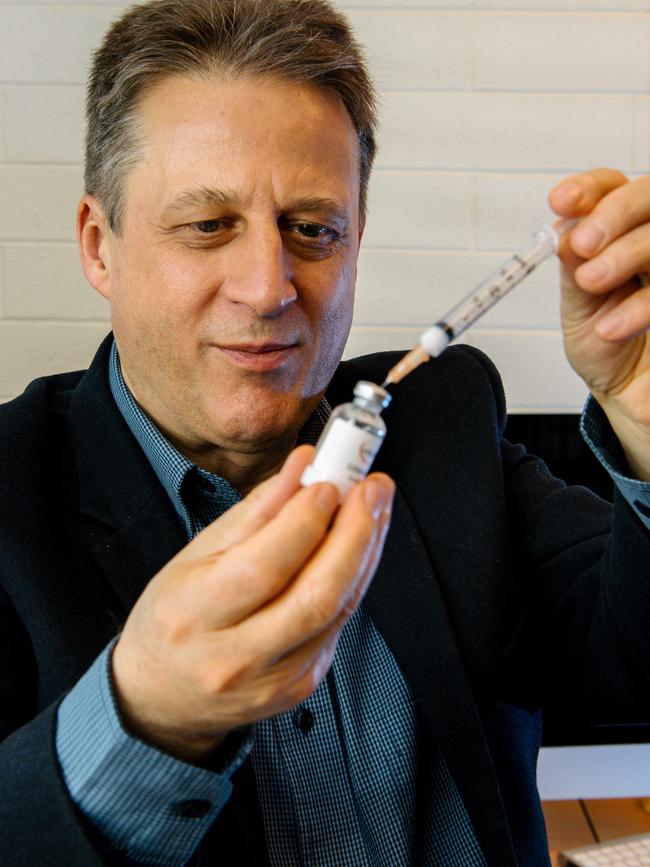Human trials of a potential COVID vaccine to start at RAH
Human trials of a potential COVID-19 vaccine are set to start at the RAH using 40 volunteers taking a drug developed by Adelaide-based Vaxine – in a major Southern Hemisphere first.

Coronavirus News
Don't miss out on the headlines from Coronavirus News. Followed categories will be added to My News.
- How to get the most out of your Advertiser digital subscription
- Flinders University Professor in COVID vaccine race
- Nightclub fury over dance floor drink ban
Human trials of a potential COVID-19 vaccine developed in Adelaide are set to start at the Royal Adelaide Hospital.
Forty healthy adults who have already been screened will receive two doses, three weeks apart, of the COVAX-19 vaccine or a placebo injection.
They will then have blood tests to measure protective antibody and T-cell responses induced by the vaccine.
Australian biopharmaceutical company, Vaxine Pty Ltd, has developed the treatment which will be the first SARS-CoV-2 (COVID-19) vaccine developed in the Southern Hemisphere to enter human trials.
The Phase 1 trial will provide initial safety and immune response data and is being conducted by the PARC clinical trial unit at the Royal Adelaide Hospital.
Professor Nikolai Petrovsky, chairman and research director of Vaxine, said the company’s modelling predicted in January that COVID-19 was a major pandemic threat that could potentially cause millions of deaths globally.

“Unfortunately our early predictions were spot on,” he said.
“Although international bodies resisted our early calls to call it a pandemic and downplayed the imminent threat, Vaxine immediately went into overdrive to develop a vaccine against the impending COVID-19 pandemic.
“Vaxine might be a small company but over the last 18 years we have learned to be extremely resourceful in our battles against some of the world’s biggest threats including SARS, swine flu, bird flu and ebola – designing pandemic vaccines that were effective in animal studies, as well as having some enter human clinical trials.
“We consequently saw it as a public health imperative to use our pandemic vaccine expertise rapidly develop a vaccine solution to COVID-19.”
Vaxine rapidly developed a variety of different potential COVID-19 vaccines, including DNA, mRNA and recombinant protein versions, but concluded the recombinant spike protein approach was best.

Prof Petrovsky, a Flinders University professor, said past experience with adenovirus-based vaccines has shown disappointing protection and high toxicity and DNA and mRNA type vaccines have their own problems, including possible unexpected side effects.
“Unfortunately most of these vaccine technologies are unable to benefit from adjuvants, which are the key turbochargers that are bolted onto protein-based vaccines to dramatically enhance their effectiveness,” he said.
“This, along with exceptional safety, tolerability, manufacturing scalability and a proven regulatory pathway, is why Vaxine chose to go with a recombinant spike protein approach.”
Vaxine has a history of world firsts; in 2009 it had a new swine flu vaccine in human trials within three months of discovery of the virus.
In 2019, it had the first vaccine technology developed using artificial intelligence enter human trials. Prof Petrovsky said Vaxine’s embrace of new technologies including its use of artificial intelligence for vaccine design enables it to develop pandemic vaccines more efficiently and faster.
“Vaxine is a virtual global open-source vaccine development company,” he said.
“This explains how we are able to consistently deliver major breakthroughs despite its modest size with a core team of just 14 people.”
Support for Vaxine has come from the National Institute of Allergy and Infectious Diseases, part of the US National Institutes of Health. Development.
Prof Petrovsky noted that long-term financial support is required to build a robust pandemic vaccine platform and advance it into human trials.
“Between pandemics, pandemic vaccine development, despite its paramount public health importance, is always going to be the poor brother to other areas of research,” he said.
Vaxine’s business manager Sharen Pringle said 18 years of hard work had gone into the research.
“This was not an overnight success,” she said.
“Pandemic research is not something you can turn on and off like a tap. People should not think that short-term funds no matter how large can deliver instant pandemic solutions after a crisis hits, it will always be too little, too late. Only long-term support can build solid pandemic vaccine platforms like Vaxine’s.”


